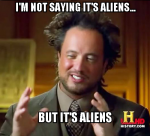I spent my morning at the Mall of America.
Don’t judge me. We’ve made this a kind of Big City Weekend Holiday, and my wife and I are hanging out here with a couple of responsibilities: I have to monitor the weirdness at the Paradigm Symposium, and Mary is shopping for the stuff she needs to be presentable at the wedding of her son in South Korea next week. Who knew there was preparation involved? I just put on clean pants and I’m good to go.
Anyway, I’m done soaking in unrepentant loud capitalism now, and have to head out to listen to an afternoon of UFOlogy. First up is Peter Robbins, a pal of the notorious Bud Hopkins. I expect to hear the latest poop on anal probings.
After that, it’s Travis Walton…the Travis Walton, who was the subject of a hollywood movie, who wrote a book called The Walton Experience, and who has a new movie out called Travis: The True Story of Travis Walton. I guess he’s fearfully terrified that you might forget his name. I expect to hear all about his dubious claims of being kidnapped by the saucer people. It should be entertaining, but not entertaining enough to make me want to hang around for the Travis Walton movie screening afterwards.
I’ve got to be back to the hotel early to write up my experiences with the UFO people.




